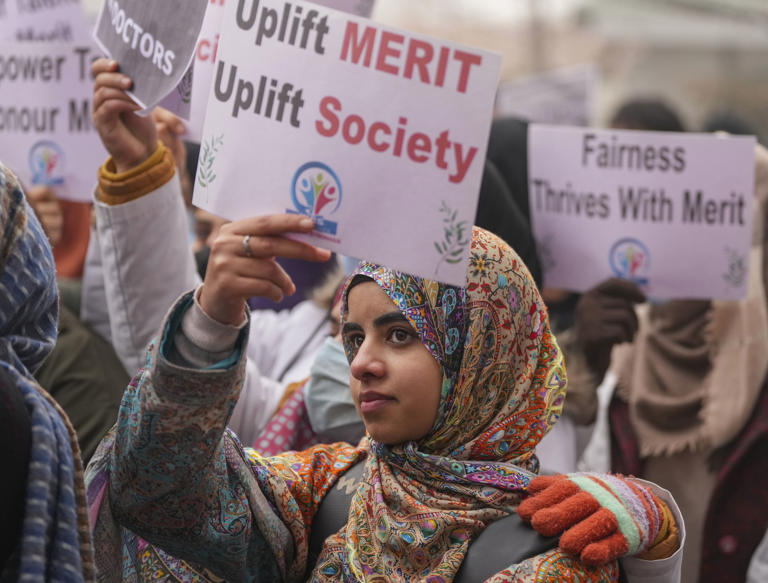The Silent Wait for Justice in Jammu & Kashmir
Srinagar | 12 June 2025
A day after Jammu and Kashmir’s Health Minister Sakina Ittoo announced that the long-awaited report on the Union Territory’s reservation policy is complete and will soon be tabled before the cabinet, opposition parties have mounted pressure on the government, demanding that the report be made public immediately.
Leading the charge, opposition leaders and student bodies have called for transparency, accusing the government of deliberately delaying the release of a report that impacts thousands of youth aspiring for government jobs and professional courses under the open merit category.
Chief Minister Omar Abdullah, speaking to reporters on Wednesday, confirmed the report’s completion and assured that it will be brought to the cabinet in the upcoming meeting. However, the assurance did little to placate student leaders and political opponents who view the delay as a strategic deferral on an issue that directly affects the future of J&K’s youth.
PDP, AIP Raise Alarm Over “Unjust Quota Regime”
People’s Democratic Party (PDP) legislator Waheed ur Rehman Parra, one of the most vocal critics of the existing quota framework, called the delay “unacceptable” and accused the government of systematically undermining open merit.
“Why hold back the cabinet committee report on merit?” Parra asked. “After your government’s adverse stand on merit in court, intentions—not actions—are under question. After six years of an unelected government, the least people deserve is transparency. Make the report public.”
Parra, who has often spoken on youth issues, said that merit is being compromised in the name of equity, but with skewed outcomes. “65% of J&K’s population is youth, who are struggling between hopelessness and dreams of a better future. Amid fragile peace, terror threats and cross-border skirmishes, the youth of Kashmir have chosen the path of merit. They want to be doctors, engineers, civil servants—builders of a better tomorrow,” he said.
He added that the biggest hurdle to their aspirations is not militancy, but policy.
“The only region in the country where youth are punished for being meritorious is, sadly, Jammu & Kashmir.”
Parra emphasized that while affirmative action is necessary to uplift historically marginalized communities, it should not come at the cost of denying justice to deserving candidates.
“Reservation is important, but it cannot in any circumstance come at the cost of merit. That’s why we are demanding pro-rata rationalisation of reservation—an equitable approach based on actual population and socio-economic data.”
He held the ruling National Conference (NC) equally accountable.
“Omar Abdullah may not have created this monster of a flawed reservation policy, but it was your party, your MLAs, and your parliamentarians who promised to correct it. With an absolute mandate of 50 seats and 70% of youth depending on open merit, what exactly are you waiting for? Which business rule, which sub-committee, or which question of statehood is stopping you?”
Student Groups Mobilise, Aga Ruhullah Lends Support
Several student groups also met Srinagar MP Aga Ruhullah on Wednesday, who had earlier led a protest march to the Chief Minister’s residence in December last year over the same issue.
The students urged Ruhullah to take a proactive role in ensuring the report is not just tabled but also made public and debated transparently.
Ruhullah assured the delegations that he would continue to pursue the matter both inside and outside the Assembly.
AIP: “This Is Betrayal, Not Bureaucratic Delay”
Awami Ittehad Party (AIP) chief spokesperson Inam Un Nabi took a more scathing tone, calling the delay a betrayal of public trust.
“This is not just negligence—it’s betrayal. The National Conference’s crocodile tears for merit are now fully exposed. They are running a sham governance model where announcements are made just to fool the youth,” he said.
Un Nabi accused the government of maintaining an unjust system that disproportionately benefits certain groups at the expense of merit-based candidates.
“The open merit category is being systematically destroyed while JKSSB recruitment advertisements keep flooding the market under a 70% quota regime. Once again, the simplest issue is being deliberately complicated,” he said.
Background: The Reservation Debate in J&K
Jammu and Kashmir’s reservation policy has long been a contentious issue, especially after the abrogation of Article 370 in 2019, which brought the Union Territory under the purview of central laws, including the national reservation framework. However, local laws and population demographics have continued to inform the implementation of reservations in education and public employment.
Critics argue that the current policy disproportionately favors reserved categories without adequate socio-economic rationalisation, leaving a vast majority of youth—especially from economically weaker sections of the general category—at a disadvantage.
A high-level committee was constituted over a year ago to review the reservation structure, including the percentage of quotas allocated to various categories such as SCs, STs, OBCs, Paharis, and EWS. The panel has reportedly submitted its findings, but the report remains under wraps, awaiting cabinet approval.
What’s Next?
While the Chief Minister’s assurance that the report will be placed before the cabinet soon may offer a temporary respite, opposition parties and student groups have made it clear they will not relent until the report is made public and its contents scrutinized.
With Assembly elections on the horizon and political equations in flux, how the government handles this issue could have significant ramifications—not just for the political establishment, but for the future of thousands of aspirants who feel trapped between systemic policy failures and uncertain prospects.


